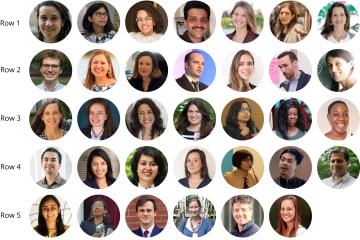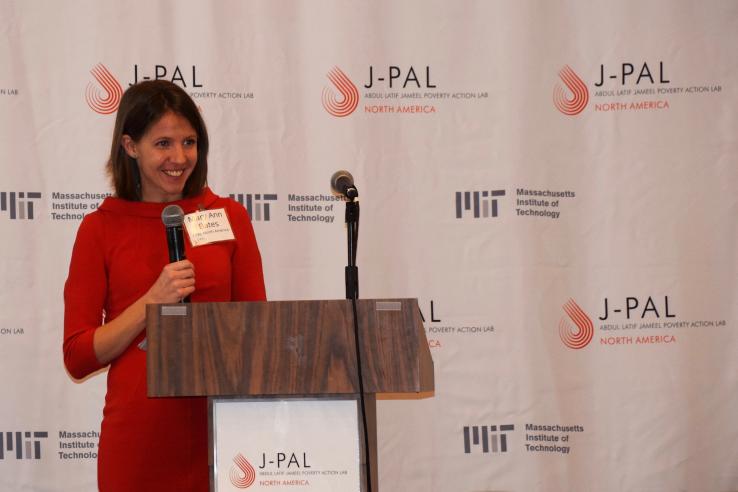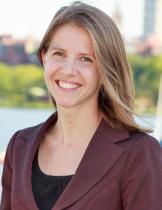
Mary Ann Bates, J-PAL ‘21, on shaping the use of data and evidence in federal and state government

The Alumni Spotlight series highlights J-PAL alumni who are making an impact across industries and around the world. To nominate a J-PAL alum to be featured in a future Alumni Spotlight, please fill out this form.
This installment of our Alumni Spotlight series features Mary Ann Bates, former executive director of J-PAL North America. She is currently the executive director of the State of California’s Cradle-to-Career System where she is leading the development of a state-wide, longitudinal data system. She reflects on her eleven years at J-PAL and the lessons she is taking with her in her new role.
You were instrumental in growing the North America office, from being the first full-time staff member to your time as executive director. How has the office’s work evolved over the years?
There has been a major shift in the perceived feasibility of J-PAL’s approach to evaluating social policy from when we founded J-PAL North America in 2013 to today. When we launched the North America office, there was an open question on whether J-PAL’s approach was needed and useful in this context, given a long tradition of impact evaluation in social policy here in the United States. As our work grew, we saw a lot of demand from governments and practitioners who were keen to collaborate with J-PAL researchers to learn the impact of programs and policies in real-world settings.
An evolution in the conversation over the past ten years led to this change. We launched the North America office at a time when the Obama administration and peer organizations around the country were also making commitments to evidence-based policy. These collective efforts proved that rigorous evaluations are possible and produce policy-relevant information. Now, instead of proving the feasibility of running experiments, there is a growing focus on ensuring that results are reaching and are useful to decision-makers. That focus is reflected in the current work of J-PAL North America.
What key reflections do you have on your eleven years at J-PAL?
First of all, when I came to J-PAL, I didn’t intend to stay for eleven years. But each year I decided to stay because I felt I was still on the steep part of a learning curve and would learn more by staying than moving on. Many aspects of J-PAL’s identity come from the fact that it’s based at a university, so I found that J-PAL’s leadership took the same approach with me as they would have with their students and academic colleagues–they were invested in helping me learn and grow. So while J-PAL wants to build a team of talented individuals, they also consider it a success if people move on into roles in government, in industry, or in the nonprofit sector. That approach defines the J-PAL alumni community.
Another key aspect of my time at J-PAL is that it was where I built my family and had my kids. Shortly after I joined, I noticed that my boss, Iqbal Dhaliwal, often talked about his young kid and how involved he was in his life. I remember noticing that Rachel Glennerster, the executive director at the time, had a picture prominently on her office wall with one of her kids in a stroller in rural India, tagging along on her field work.
As I worked with my colleagues across our international offices, our families and our kids were always celebrated as a key part of our identities–and even welcome to tag along when it made sense. Adding a family backpacking trip to Patagonia onto the end of a work trip to J-PAL’s offices in Chile is still a highlight of my J-PAL memories. I found it incredibly empowering to be at an organization where I was able to continue an ambitious and challenging career while also having the space to be a parent, and not feel like I had to hide that part of my life while at work. It’s one of the key values I want to bring to my new work in California.
While at J-PAL North America, you took a leave of absence to join the White House Office of Management and Budget (OMB). What projects did you support there?
I served at OMB as Senior Fellow through a program called the Intergovernmental Personnel Act. There, I primarily worked with the Biden-Harris Administrations President’s Management Agenda (PMA), which is a bit like a strategic plan for operationalizing priorities of the administration. I drove the creation of the first government-wide learning agenda to accompany the PMA, which identified top unanswered questions that the administration wanted to address to achieve their objectives efficiently.
This work particularly excited me because it built on the work of the Evidence-Based Policy Making Act and the work of the Office of Evaluation Sciences, which J-PAL has been proud to support since its launch.
In February, you started a new role with the State of California. What is the focus of your current work?
I’m now the executive director of California’s new Office of Cradle-to-Career Data, which aims to create a longitudinal data system for California in order to promote evidence-based policy making and support more equitable futures for Californians.
With this system, we plan to bring together information from educational, workforce, and health and human services systems. From this data, we hope to better understand the barriers young people may face from cradle to career: from early learning to K-12, and across transitions to further education or training and workforce participation.
Our goal is to present this data in a way that's accessible and useful for families and students, not just researchers and data analysts. We want to create dashboards and query builders that let anyone dig into the data and find answers to their questions.
How has your past experience with J-PAL shaped your perspective in leading the Cradle to Career Data System?
Being able to work directly within a state government builds on many of the partnerships and projects I found most fulfilling during my time at J-PAL. While at J-PAL North America, we launched the State and Local Innovation Initiative to gain a better understanding of their priorities and how we could support them. While working at the federal level at OMB, I was able to see just how many social policies are implemented at the state and local level. It’s exciting to get to work within state government, particularly in a state as big as California, where understanding impact at scale can have relevance beyond our state
More broadly, one of the most valuable lessons I learned at J-PAL is the importance of being open to changing your mind. There are multiple evaluations that genuinely changed my underlying assumptions about what approaches work–or not. This lesson is incredibly important for my role now. The Cradle to Career Data System is not a research institution; we're stewards of the data. We're not expected to weigh in on policy matters or put out our own research analyses. That means the ability to be open to where the data leads is particularly salient.



